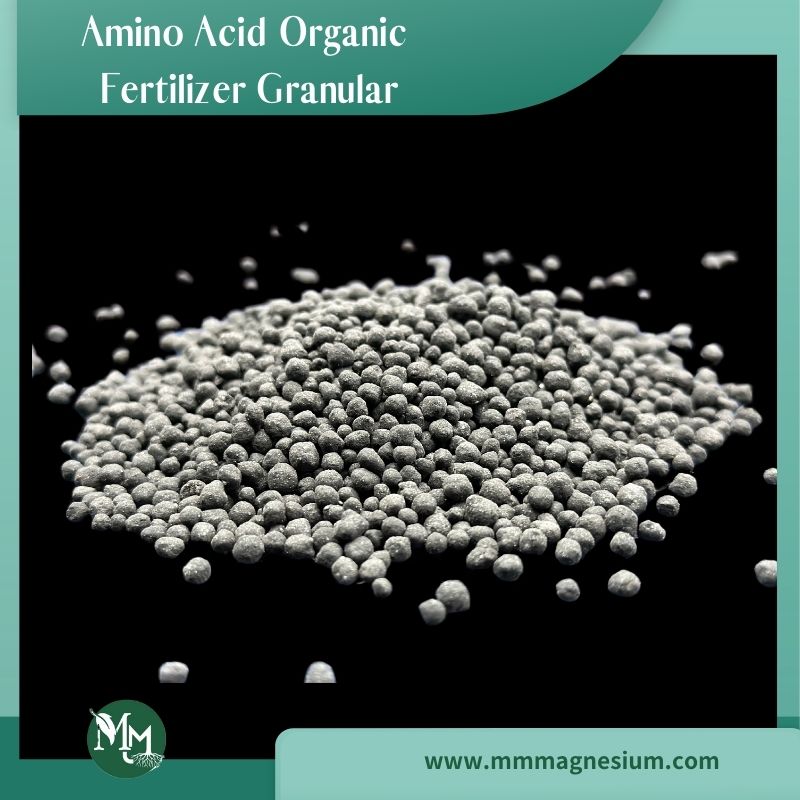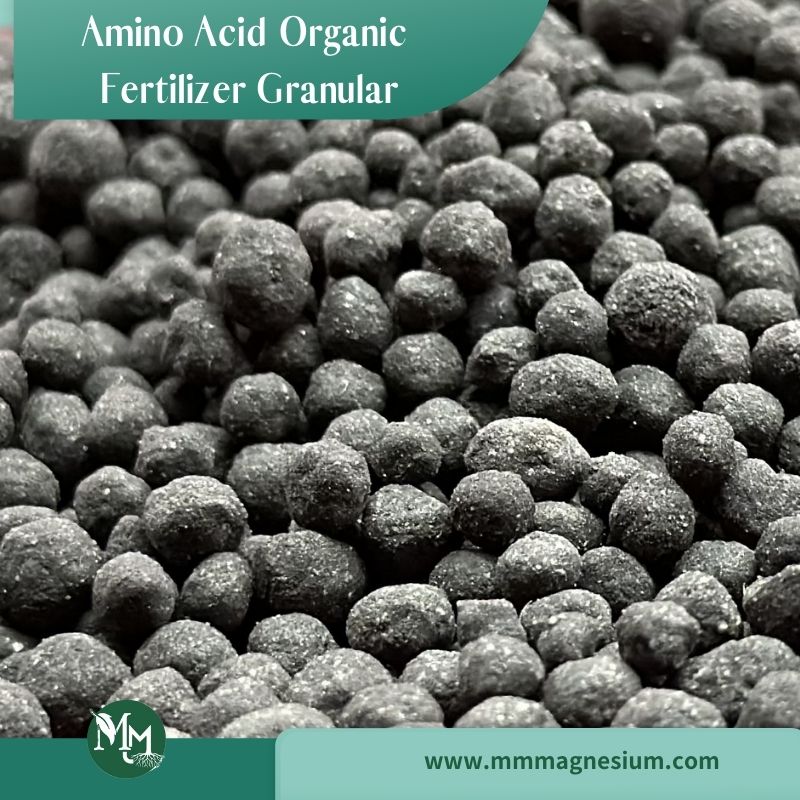

Organic matter ≥15%
Amino acid ≥10%
Si+Ca+Mg≥5%
Trace elements ≥0.1%
Granular size:2-5mm
Applicable crops: Widely used in vegetables, fruits, grains, cotton oil, tea, flowers and lawns.




Yingkou Maomei Agricultural Technology Co., Ltd., relying on high-quality mineral resources, produces Amino Acid Organic Fertilizer Granular products with advanced technology and the following characteristics:
Products are exported to the United States, Russia, Indonesia, Canada, Spain, Malaysia, Bangladesh, and other countries, and also cover all provinces, cities, and regions across the country.
For more service advantages of Yingkou Maomei Agricultural Technology, please see Why choose us? and Factory Photos.
Advantages of Amino Acid Organic Fertilizer Granular
1. Improve production and quality
As the basic nutrients for crop growth, amino acids directly participate in cell division and growth processes and promote protein synthesis in plants. Medium and trace elements such as zinc and iron further improve the photosynthetic efficiency of crops by enhancing chlorophyll synthesis and photosynthesis, thus promoting the growth and development of crops. In addition, the supplementation of amino acids and trace elements can increase the sugar, vitamin content and flavor of fruits, so that not only the yield of crops is increased, but the quality is also significantly improved.
2. Enhance soil fertility
The supplement of humic acid and organic matter enables soil particles to form a good aggregate structure and increases soil aeration and water retention capacity. At the same time, these organic components can also increase the organic matter content in the soil and improve the buffering capacity and fertility of the soil. By improving the soil environment and promoting the activity of beneficial microorganisms, it is conducive to the decomposition and transformation of nutrients, enhances soil fertility, and supports long-term healthy growth of crops.
3. Promote nutrient balance
Granular fertilizers containing amino acids and medium and trace elements can effectively supplement a variety of trace elements lacking in the soil, such as calcium, magnesium, boron, copper, etc. These elements play important physiological roles during crop growth, promoting enzyme activity and metabolism. By comprehensively supplementing these necessary trace elements, soil nutrient imbalances can be corrected, ensuring that crops receive balanced nutrition, promoting healthy growth and efficient nutrient utilization.
4. Improve crop resistance
Amino acids can enhance the structure of crop cell walls and improve the overall immunity of plants. Medium and trace elements such as silicon, calcium and copper can strengthen the physical barrier and antioxidant capacity of crops and reduce the invasion of pests and diseases. In addition, these elements can also help crops cope with adverse environmental conditions, such as drought, cold and salinity, and enhance crop stress tolerance. By improving the disease resistance and stress resistance of crops, we can reduce the impact of pests, diseases and environmental stress on crops, ensuring healthy crop growth and stable yields.

Fertilization Recommendations
It is recommended to choose methods such as broadcasting, strip application or hole application to ensure that the fertilizer is evenly distributed throughout the planting area, which is conducive to full absorption and utilization by the root system.

1. Protect from rain and sunlight, store in a ventilated and dry place, and do not transport or store together with toxic and hazardous substances.
2. Each bag is 25 kg, and we can also provide packaging as small as 1 kg or as large as ton bags according to customer requirements.
3. Plastic woven bags, lined with plastic inner bags. We provide all available packaging such as paper plastic bags/kraft paper bags/PE bags.
4. We provide a variety of transportation methods: road transportation, railway transportation, air transportation, container transportation, and ocean transportation.
5. Our company's marks can provide OEM or neutral marks.

FAQ
1.Are your fertilizers organic or synthetic?
We have a full range of fertilizers, including organic and synthetic fertilizers. You can choose the right type of fertilizer based on your planting needs and agricultural standards.
2.What if the product has quality problems?
We attach great importance to product quality. If you find any quality problems during use, please contact us immediately. We will conduct a detailed investigation and provide reasonable solutions such as return, exchange or compensation to ensure that your rights are protected.

Product Knowledge:What are the different functions of amino acids and humic acid in organic fertilizers?

Amino acids are mainly derived from the decomposition products of plant or animal proteins, and can also be obtained through microbial fermentation. Humic acid is a type of natural organic matter, usually derived from the decomposition and transformation of plants, animals or microorganisms in the soil. Amino acids are basic nutrients necessary for plant growth and development, and their role in organic fertilizers is mainly reflected in the following aspects:
Humic
Acid
Amino Acids
Provides
a source of nitrogen and nutrients:Amino acids are rich in nitrogen and are an important component of protein
synthesis in plants. The supply of amino acids in organic fertilizers can
provide plants with a directly absorbable nitrogen source, promoting plant
leaf growth and photosynthesis. This is particularly important during rapid
growth stages with high nitrogen requirements, such as seedlings and vigorous
growth. Adding amino acids can increase the nitrogen absorption rate of crops
by more than 20%, while significantly increasing crop yield and quality.
Enhance the ability of plants to
absorb nutrients: Humic acid has good chelating properties and can combine
with inorganic nutrients in the soil (such as iron, zinc, copper, etc.) to
form stable compounds that can be absorbed by plants. This not only increases
the effectiveness of nutrients in the soil, but also improves the absorption
and utilization efficiency of these nutrients by plants.
Enhance
nutrient use efficiency:Amino acids can improve plants' absorption and utilization efficiency of
other nutrients (such as phosphorus, potassium, etc.). Research shows that
amino acids can promote root development and increase the diversity of
rhizosphere microorganisms, thereby increasing the conversion rate of soil
nutrients and the plant's nutrient absorption capacity.
Improve soil structure and water
retention capacity: Humic acid has good water retention and water storage
capacity, which can improve the physical structure of the soil and increase
the air permeability and water retention of the soil. This is especially
important for arid areas or areas with poor soil, and can effectively reduce
water evaporation losses and improve soil water utilization efficiency.
Regulating
plant physiological metabolism:Amino acids are not only raw materials for protein synthesis in plants, but
also participate in regulating the physiological metabolic processes of
plants. It can affect the plant's disease resistance and stress resistance,
regulate the plant's response to environmental stress, and make the plant
more adaptable to different growth conditions.
Promote soil microbial activity: Humic acid can serve as a carbon source and energy source for microorganisms,
promoting the growth and activity of soil microorganisms. These
microorganisms include bacteria, fungi, etc. Their activities in the soil can
promote the decomposition of organic matter, the release and conversion of
nutrients, thereby improving the fertility and nutrient supply capacity of
the soil.
Enhance
the stability of soil ecosystems:The amino acids in organic fertilizers help build a healthy soil ecosystem
by promoting soil microbial activity and diversity. This can not only improve
the soil structure, enhance soil aeration and water retention, but also
reduce soil erosion and improve the soil's ability to resist weathering.
Regulate soil pH Value and
reduce soil pollution: Humic acid has a buffering effect in the soil, which
can adjust the pH value of the soil and keep it within a suitable growth
range. In addition, it can also reduce the accumulation of heavy metals and
chemicals in the soil and reduce the risk of soil pollution.
Yingkou Maomei Agricultural Technology Co., Ltd
Name: Brenda
Mobile:86-188-7490-2028
Tel:86-400-699-8826
Whatsapp:86-18874902028
Email:info@maomeimg.com
Add:Qianjia Village, Nanlou Economic Development Zone, Yingkou City, Liaoning Province, China